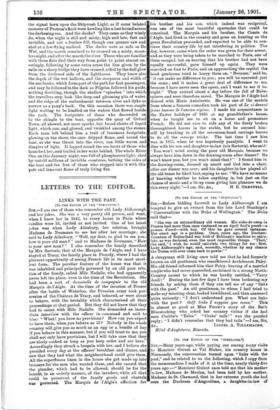LETTERS TO THE EDITOR.
LINKS WITH THE PAST.
(To THE EDITOR OF THE "SPECTATOR.'] Srn,—I am one of those who remember old Lady Aldborough and her jokes. She was a very pretty old person, and went, when I knew her in 1842, to every house in Paris where candles were lit, invited or not invited. One of her latest jokes was when Lady Ailesbury, her relation, brought Madame de Neumann to see her after her marriage; she said to Lady Ailesbuzy, "Well, my dear, so glad to .see you; how is your old man P" and to Madame de Neumann, "How is your new man?" I also remember the family described by Mrs. Sartoris, that of the Marquis de l'Aigle, and I have stayed at Tracy, the family place in Picardy, where I had the pleasant opportunity of seeing French life in its most excel- lent form. The peculiar feature of the house was that it was inhabited and principally governed by an old poor rela- tion of the family, called Mlle. Nadalle, who had apparently never left the place, even in the time of the Revolution. She had been a sort of demoiselle de compagnie to the old Marquis de l'Aigle. At the time of the invasion of France after the battle of Waterloo, the Prussian army took pos- session of the Chateau de Tracy, and behaved, or were about to behave, with the brutality which characterised all their proceedings at that period. But they did not know that they had to count with Mlle. Nadalle. She demanded an imme- diate interview with the officer in command and said to him: " What ! you have no provisions? How can you expect to have them, when you behave so ill? Nobody in the whole country will give you so much as an egg or a bundle of hay if you behave in this manner, but if you will trust to me, you shall not only have provisions, but I will take care that they are nicely cooked as long as you keep order and are here." Accordingly they struck a bargain with her, and I believe she presided every day at the officers' breakfast and dinner, and saw that they had what the neighbourhood could give them. All the superfluous linen in the house she got made up into trousers for the men who wanted them, and she caused that the plunder, which had to be allowed, should be for the benefit, in an orderly manner, of the invaders, while all that could be preserved of the family goods and chattels was protected. The Marquis de l'Aigle's affection for his brother and his son, which indeed was reciprocal, was one of the most beautiful spectacles that could be conceived. The Marquis and his brother, the Comte de l'Aigle, had lived in the country and gone on hunting as the great Revolution proceeded, and expected to be able to con- tinue their country life by not interfering in politics. The day, however, came when the order was given for their arrest, and as they were being taken to be marched to Paris, one of them escaped, but on hearing that his brother had not been equally successful, gave himself up again. They were marched on foot to Paris, and on approaching the capital the head gendarme tried to hurry them on, "Because," said he, "it can make no difference to you ; you will be executed just the same ; and it makes a great deal of difference to me, because I have never seen the opera, and I want to see it to- night." They arrived about a day before the fall of Robe- spierre and were therefore saved. The Marquis de l'Aigle had danced with Marie Antoinette. He was one of the models from whom a famous comedian took his part of Le ci-devant jeune homme de rancien regime. I made his acquaintance in the Easter holidays of 1835 at my grandfather's house, when he taught me to sit on a horse and pronounce French. He did not care to ride any of the finely broken thoroughbred horses in the stable, but he amused him- self by breaking in all the seventeen-hand carriage horses to do all the maniye tricks. The last time I saw him was in 1855, when he was hopelessly paralytic. I went to dine with his son and daughter-in-law (née Sartoris), who said: You won't mind seeing the poor old Marquis, because we always have him down in the drawing-room after dinner? He won't know you, but you won't mind that ? " I found him in the drawing-room, dressed up smart and tied into a chair, after our dinner was over; and his daughter-in-law played all the old tunes he liked best, saying to me: "We have no means of knowing whether he takes anything in, but just on the hence of music and a lit-up room giving him pleasure we do
this every night."—I am, Sir, &c., H. R. GRENPRIZ.


















































 Previous page
Previous page